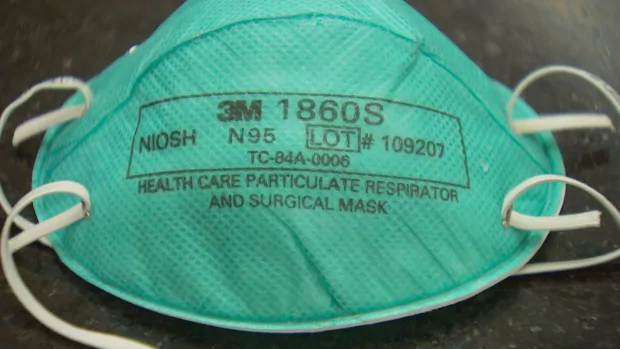Alberta Health Services collecting, cleaning used N95 masks for possible reuse

Alberta Health Services (AHS) began collecting used N95 masks from intensive care units in Edmonton and Calgary Tuesday. AHS says the collection is part of a contingency plan in the “unlikely event” the province runs out of the respirators.
While many regions are facing shortages of personal protective equipment for healthcare workers, including masks and respirators, Alberta Premier Jason Kenney announced Saturday that the province would send hundreds of thousands of masks, along with other supplies and equipment, to Ontario, Quebec and British Columbia.
Kenney has said the province is well stocked with medical equipment and supplies to meet demand during the COVID-19 pandemic.
There is no plan to put the used N95 1870+ respirators that are being collected back into circulation at present, but the health authority is trying to be proactive, AHS spokesperson Sabrina Atwal said in an email Tuesday.
“This initiative proactively positions us to ensure short- and long-term protection of our staff, and appropriately conserve the N95 respirator supply in Alberta,” Atwal said. “Safety of our staff is paramount to all initiatives that we undertake, particularly during this pandemic.”
United Nurses of Alberta president Heather Smith said Tuesday that as long as the masks that are collected are gently used, and that it’s with the understanding that reusing N95s is a “last resort option.”
“It’s always been made very clear that it’s a last resort undertaking, but if you don’t start collecting them for that possible purpose, it would be too late to start after we’ve hit a supply issue,” she said.
In an emailed statement, Health Sciences Association of Alberta president Mike Parker said his union, which represents various health-care workers such as paramedics and pharmacists, is waiting on the mask’s manufacturer to confirm reuse is safe. He added that the union has also been assured there are enough N95s in stock.
The 1870+ model is the only type of respirator being collected for the recycling project because it’s the only model currently known to withstand steam sterilization, Atwal said.
She added that about 80 per cent of health-care workers use the 1870+, and that AHS will look at other models for reprocessing down the road.
Atwal said the emerging research has shown that reprocessing –– decontaminating, sterilizing, and storing –– this particular model of respirator does not damage it or reduce the effectiveness or safety.
Though the masks are only being collected in ICUs in Alberta’s two largest cities at present, Atwal said that as reprocessing is refined, the practice may expand to other healthcare facilities around the provinces.
The masks are only being collected in ICUs in Alberta’s two largest cities at present, where Atwal said staff have been trained about what masks should and should not go into the recycling bins: masks that are visibly soiled, ripped, torn, or that have torn elastics should be thrown out.
Earlier this month, researchers in both Saskatchewan and Manitoba announced promising results with finding ways to decontaminate N95 masks.



